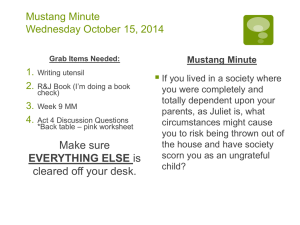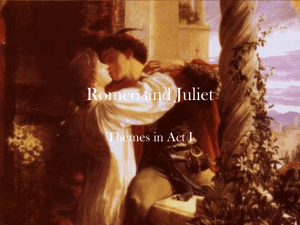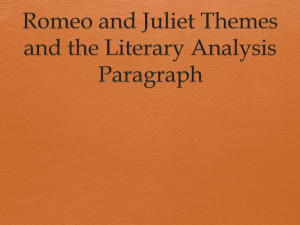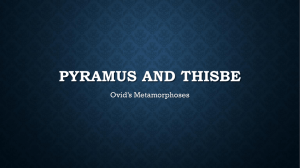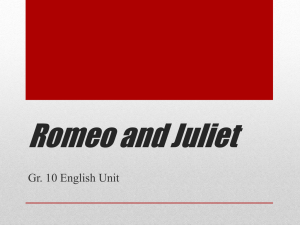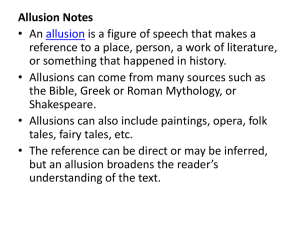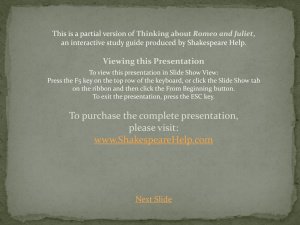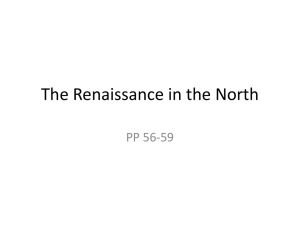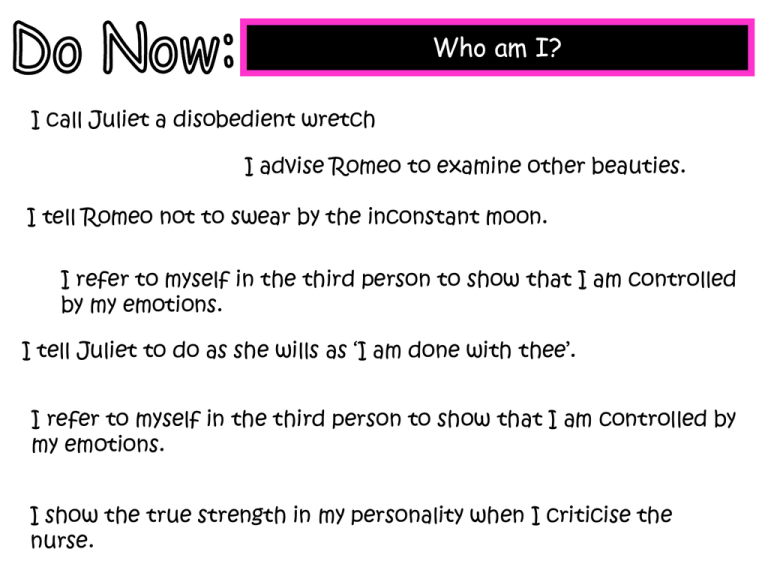
Who am I?
I call Juliet a disobedient wretch
I advise Romeo to examine other beauties.
I tell Romeo not to swear by the inconstant moon.
I refer to myself in the third person to show that I am controlled
by my emotions.
I tell Juliet to do as she wills as ‘I am done with thee’.
I refer to myself in the third person to show that I am controlled by
my emotions.
I show the true strength in my personality when I criticise the
nurse.
Who?
ALL
MOST
SOME
What will I know and/or
demonstrate by the end of
the lesson?
What are
my
key terms?
What is my
target
level/grade
?
Identify events that relate to
theme and explain how they
relate.
Explain
D
Explain in detail how themes
are explored in sections of
the novel.
Detail
C
Explore the relationship
between language, theme
and historical context in and
extract of the novel.
Explore
B
Task:
• Use the sheets about each of the scenes to complete your
mind maps.
• You can add to the mind map using your own observations.
1. Act 2 Scene 2 – Romeo and Juliet
2. Act 2 Scene 3 – Romeo and the Friar
3. Act 2 Scene 5 – Juliet and the Nurse
4. Act 3 Scene 5 – Capulet, Lord Capulet,
Nurse and Juliet
Act 2 Scene 2: The Balcony Scene
• Romeo describes Juliet as the sun. This suggests that he views her as beautiful, the source of
light and hope for the future. The sun represents certainty as it rises everyday, suggesting his
love for Juliet is certain.
• Romeo refers to Juliet as ‘my lady’ and ‘my love’. The use of possessive pronoun suggests
that he assumes he owns Juliet, reflecting the position of women. The soft alliteration makes
Romeo sound poetic and caring, contrasting Lord Capulet’s treatment of her.
• Romeo refers to Juliet as a bright angel and a saint, suggesting that he idolises her beauty
and considers her prefect and flawless.
• Juliet states that she doesn’t think that names are important suggesting that her love for
Romeo is stronger than family loyalty.
• Romeo states that he would rather risk death than not speak to her suggesting that his love
makes him reckless.
• Juliet is concerned that she is too quickly won, highlighting the importance of remaining
chaste for women at the time.
• Juliet asks Romeo not to swear by the moon as the moon symbolises something changeable
and fickle. This shows that Juliet is concerned that she has sworn her love too soon and that
Romeo will change his mind, leaving her reputation ruined.
• Juliet calls Romeo a ‘god’ highlighting her idolisation of him and also implies a power balance
between them as saints and angels serve gods.
• Juliet uses imagery of the sea to explain her love. This shows the extent of her love.
• Juliet uses imperatives at the end of the scene to show that she is taking control of the
situation. This shows that she is aware of her vulnerability by declaring her love.
Act 2 Scene 3: Romeo and Friar Laurence
• Friar Laurence asks Romeo where he has been all night which shows fatherly
concern.
• Friar Laurence asks Romeo whether he has been with Rosaline which reminds the
audience how suddenly Romeo has changed his mind and declared his love for
another woman.
• Romeo uses a rhyming couplet to confirm that he has not been with Rosaline. This
creates a tone of certainty emphasising that he has completely changed his mind
and no longer cares for Rosaline.
• Romeo refers to falling in love with Juliet as being wounded which foreshadows the
painful consequences of his love for her.
• Friar Laurence asks Romeo to be clear about what he is saying and get to the point
which shows the Friars anxiety and care for Romeo.
• Romeo uses another rhyming couplet to declare his love for Juliet which suggests a
tone of certainty.
• Romeo asks for Friar Laurence to marry him ‘today’ highlighting his hurry to marry
Juliet reminding the audience that they are having to make plans in secret.
• Friar Laurence is extremely reluctant to agree to marry them stating this his love lies
in his eyes and not his heart as he has changed his mind so quickly. This shows that
the Friar is against the sudden plans.
• Against his better judgment Friar Laurence agrees to marry him, and this time uses
a half rhyming couplet. This creates a tone of uncertainty and a tone of foreboding.
Act 2 Scene 5: The Nurse and Juliet
•
•
•
•
•
•
•
•
•
At the start of the scene Juliet repeatedly mentions time, which shows her impatience for
news and desperation to marry Romeo.
Juliet refers to the nurse’s age disrespectfully which highlights her impatience.
When the nurse returns, Juliet uses flattering language which shows that she wants to
persuade the nurse to tell her the news. The contrasting language shows that Juliet is a
spirited character with her own views and opinions.
Juliet repeatedly uses imperatives which emphasises her frustration and the power she has
over the nurse who is her servant. This suggests that the nurse is not a good mother figure
for Juliet as she is ultimately ruled by her.
The nurse teases Juliet by withholding the nurse, which suggests that she doesn’t
understand the extent of Juliet’s emotions.
The Nurse passes judgment on Romeo’s appearance and character stating that Juliet has not
picked well but claiming that Romeo is as gently as a lamb, which emphasises how out of
character it is when Romeo kills Tybalt.
Juliet uses repeated questions when speaking to the nurse emphasising her increasing
frustration and hurry to marry Romeo.
The nurse uses sexual innuendo throughout her conversation with Juliet. This shows that
Shakespeare wants to portray the reality that women are not really different to men in their
attitudes towards sex despite society’s expectations.
At the end of the scene Juliet says ‘farewell’ to the nurse. This is significant as Juliet is saying
goodbye to her childhood as she moves into another period of her life. It also hints at this
moment being the start of the end of her life.
Act 3 Scene 5: Lord Capulet, Lady Capulet, Nurse and Juliet
• When Juliet refuses to marry Paris, Lord Capulet calls her ‘unworthy’ and refers
to Paris as ‘worthy’, which shows that he has no respect for his daughter or her
wishes.
• Lord Capulet repeatedly insults his daughter. This is shocking, particularly for a
modern audience as this is not how fathers are expected to talk to their
daughters.
• Lord Capulet states that he has worked hard to ‘have her matched’, which
shows the position of women and the lack of choice they have over their own
future.
• The nurse tries to stick up for Juliet, which highlights her mother’s failure to
stick up for her showing Juliet’s lack of parental love.
• Lady Capulet speaks in monosyllabic statements telling her ‘I have done with
thee’ showing her lack of concern for her feelings.
• Lady Capulet refers to her as ‘thee’ the formal form of you, which shows the
detachment between her and her own daughter.
• The nurse advises Juliet to agree to marry Romeo, which highlights the lack of
sensible guidance in Juliet’s life and her limited options.
• Juliet uses a sarcastic tone when telling the nurse that she has comforted her,
which shows that she is now on her own with no parental guidance,
foreshadowing her desperation to turn to Friar Laurence as her last remaining
hope.
When ____(scene)______Shakespeare explores
_____(theme/character).
When ____(events/character
says…/Shakespeare uses…) it shows……
Furthermore . . . .
This highlights/reflects (historical context)
This links to/foreshadows (another moment in the
play)

